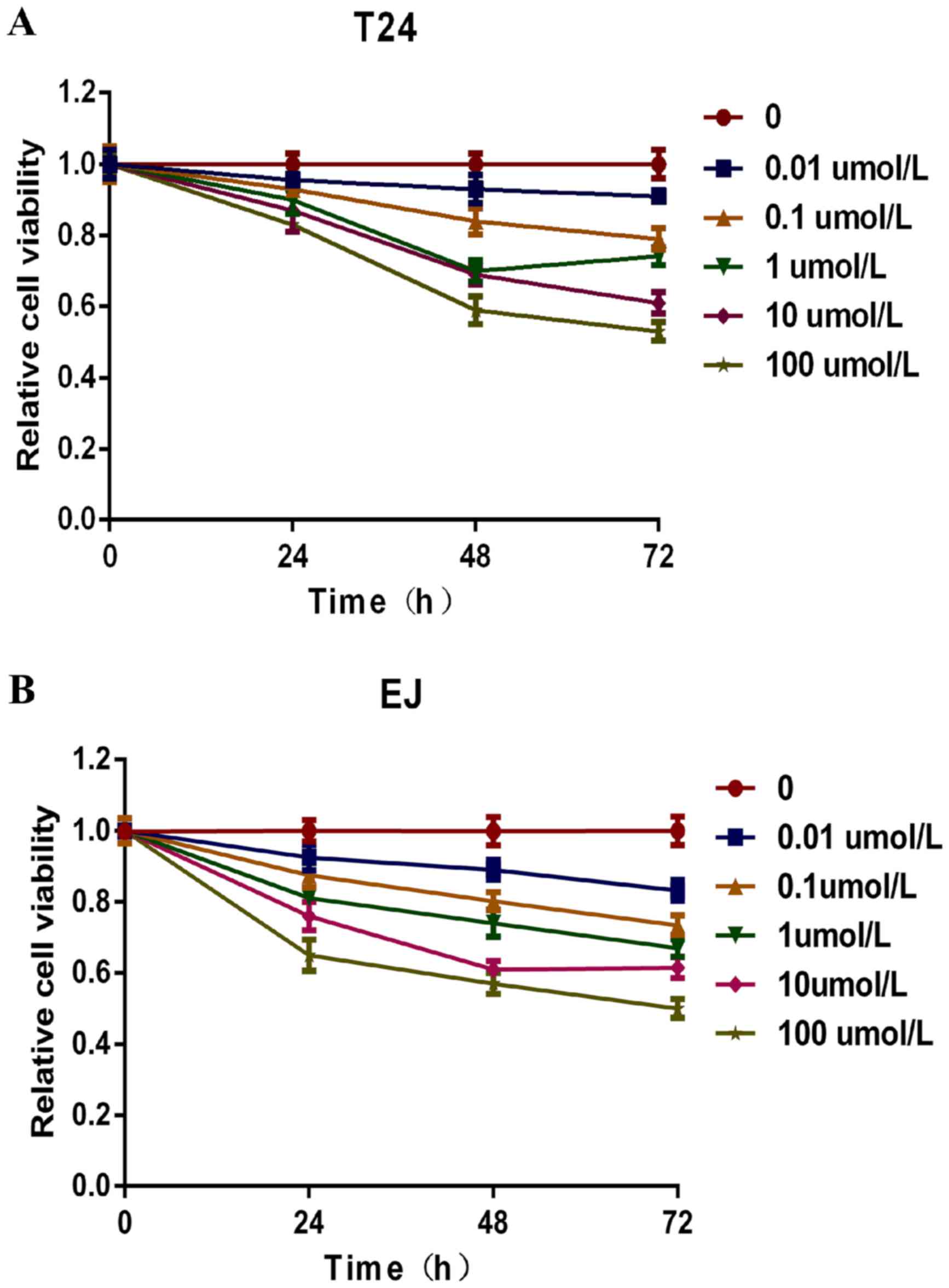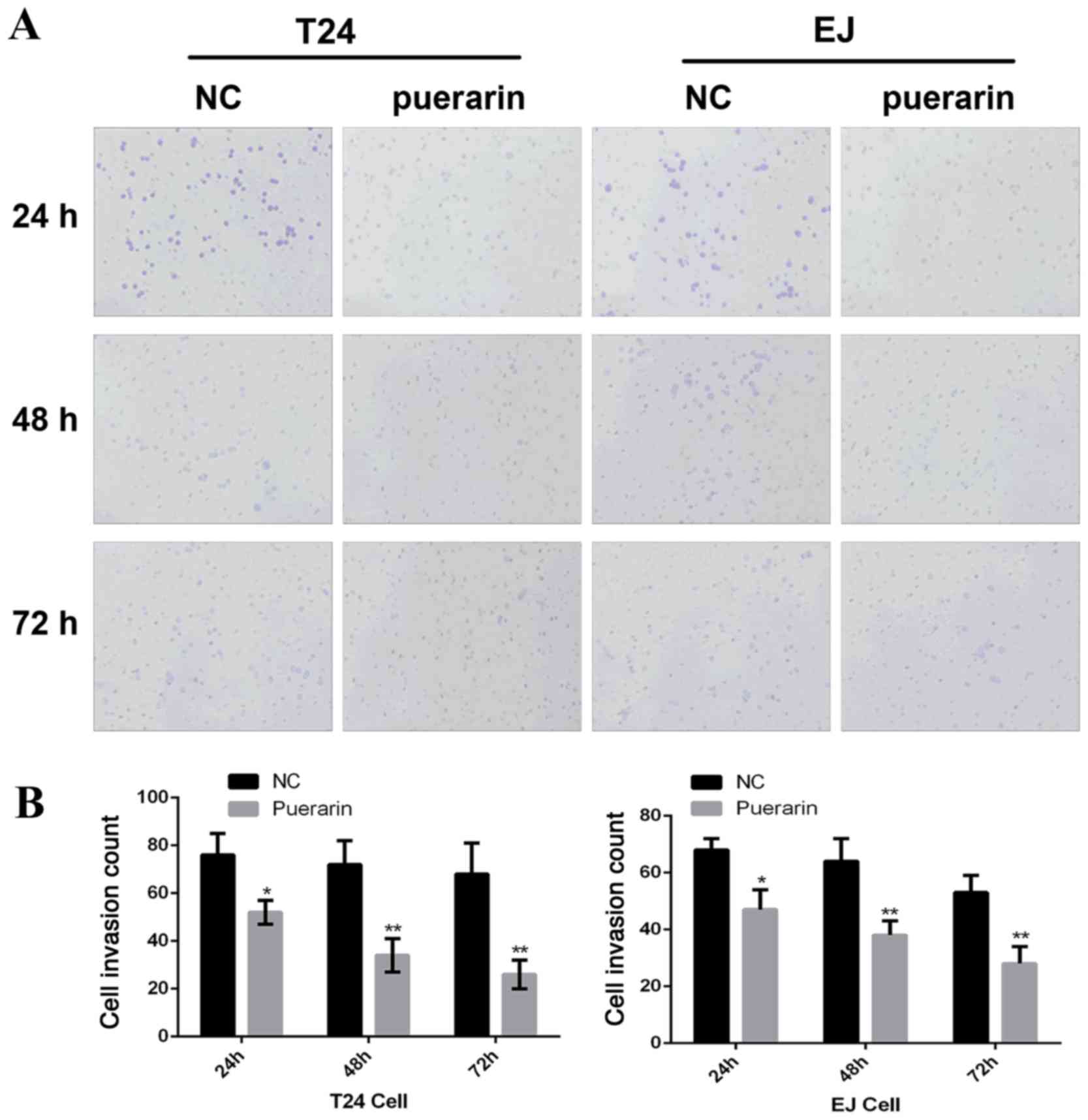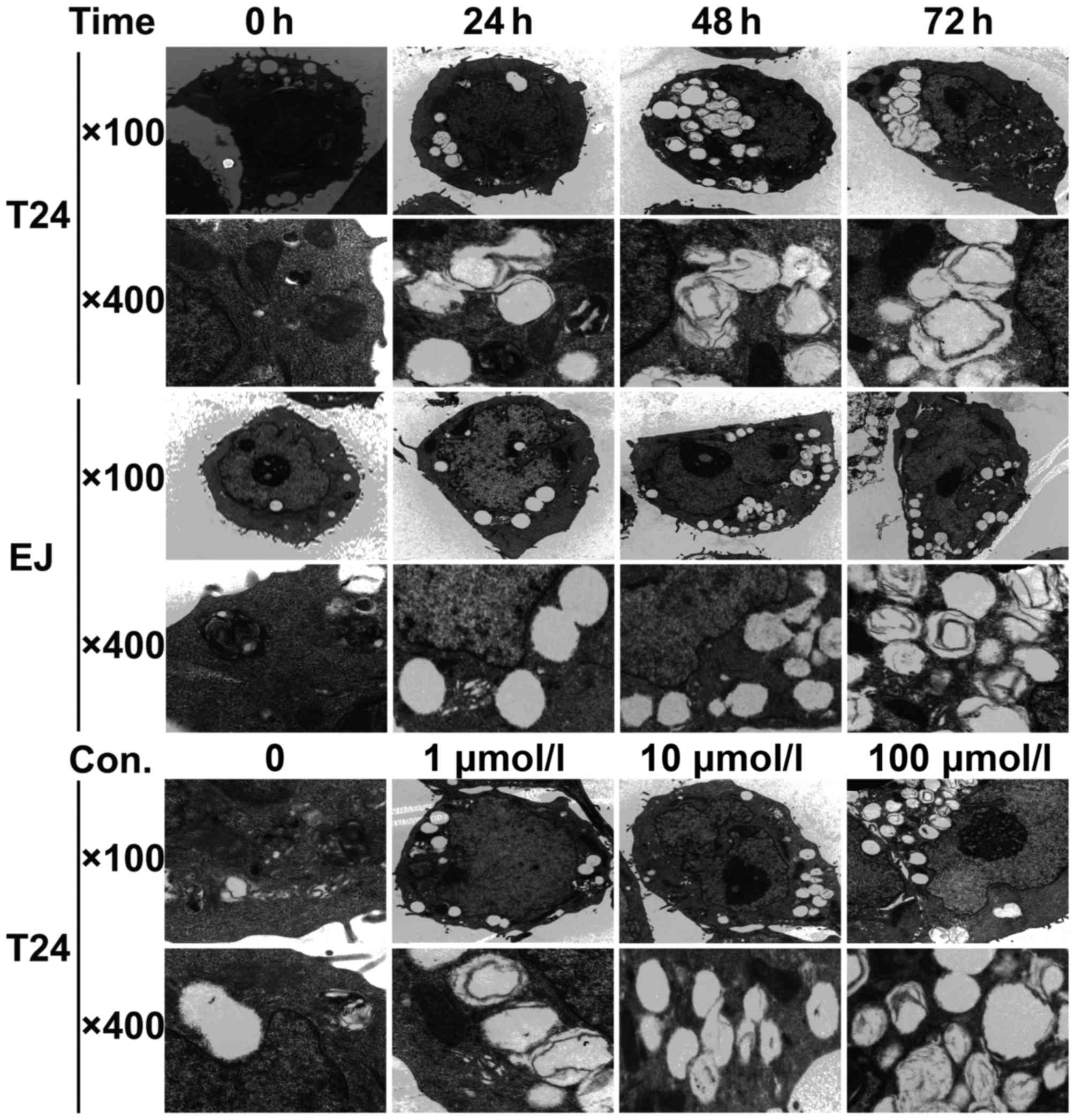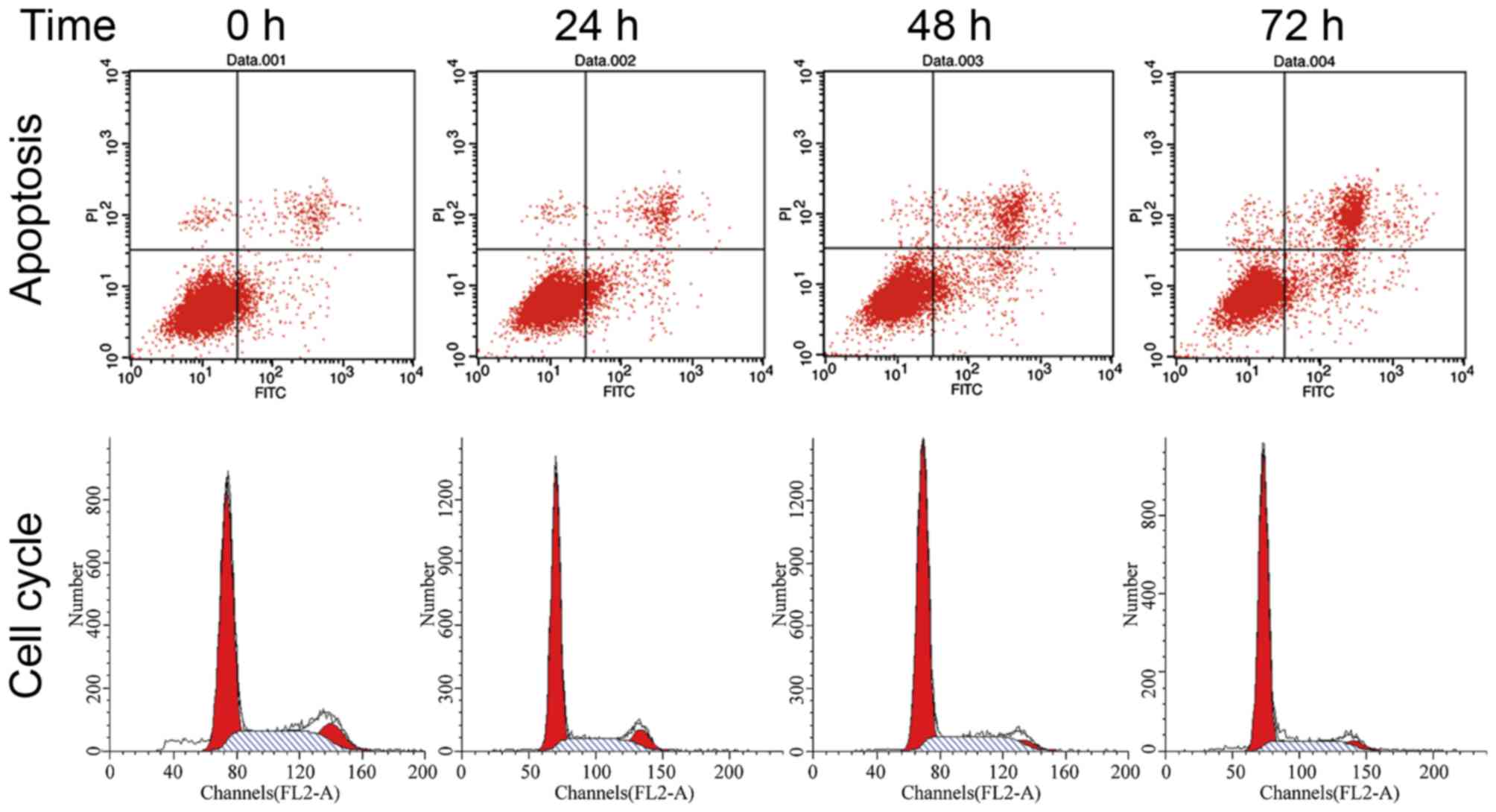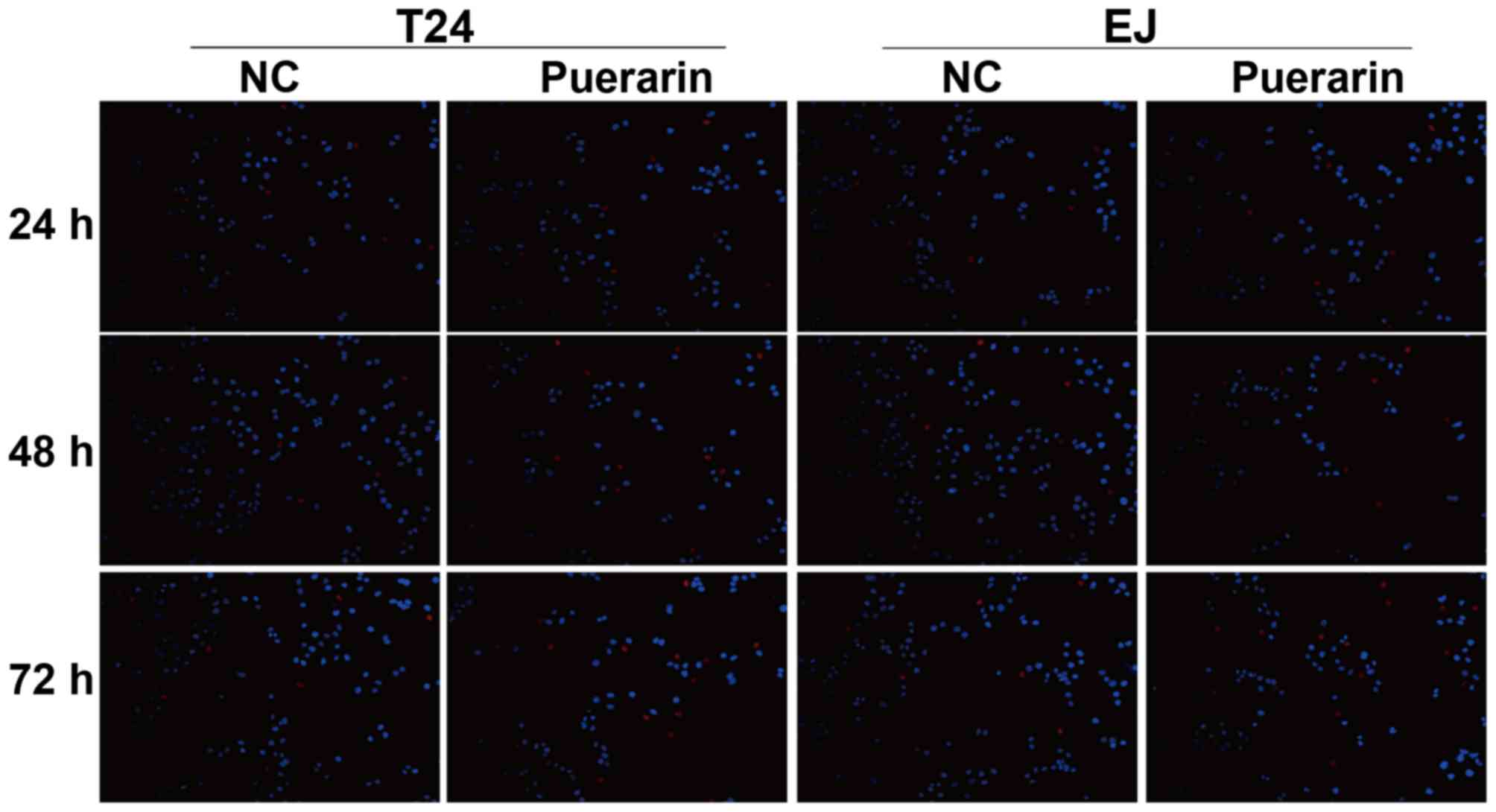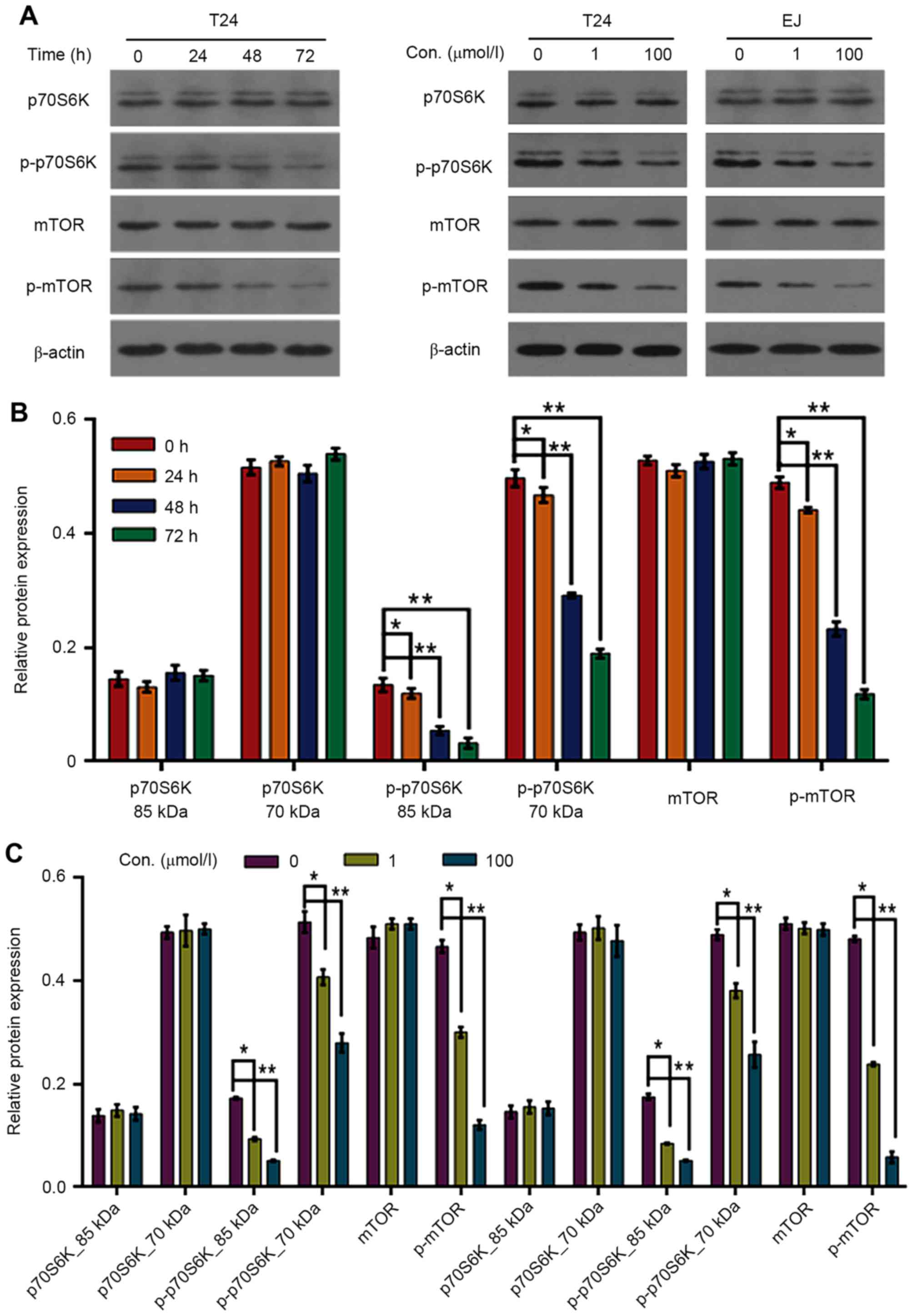|
1
|
Siegel RL, Miller KD and Jemal A: Cancer
statistics, 2015. CA Cancer J Clin. 65:5–29. 2015. View Article : Google Scholar : PubMed/NCBI
|
|
2
|
Babjuk M, Burger M, Zigeuner R, Shariat
SF, van Rhijn BW, Compérat E, Sylvester RJ, Kaasinen E, Böhle A,
Redorta J Palou, et al: EAU guidelines on non-muscle-invasive
urothelial carcinoma of the bladder: Update 2013. Eur Urol.
64:639–653. 2013. View Article : Google Scholar : PubMed/NCBI
|
|
3
|
Burger M, Catto JW, Dalbagni G, Grossman
HB, Herr H, Karakiewicz P, Kassouf W, Kiemeney LA, La Vecchia C,
Shariat S and Lotan Y: Epidemiology and risk factors of urothelial
bladder cancer. Eur Urol. 63:234–241. 2013. View Article : Google Scholar : PubMed/NCBI
|
|
4
|
Schenk-Braat EA and Bangma CH:
Immunotherapy for superficial bladder cancer. Cancer Immunol
Immunother. 54:414–423. 2005. View Article : Google Scholar : PubMed/NCBI
|
|
5
|
Shen Z, Shen T, Wientjes MG, O'Donnell MA
and Au JL: Intravesical treatments of bladder cancer: Review. Pharm
Res. 25:1500–1510. 2008. View Article : Google Scholar : PubMed/NCBI
|
|
6
|
Bosschieter J, Nieuwenhuijzen JA, van
Ginkel T, Vis AN, Witte B, Newling D, Beckers GMA and Moorselaar
RJAV: Value of an immediate intravesical instillation of mitomycin
C in patients with non-muscle-invasive bladder cancer: A
prospective multicentre randomised study in 2243 patients. Eur
Urol. July 10–2017.(Epub ahead of print). View Article : Google Scholar
|
|
7
|
Deng T, Liu B, Duan X, Zhang T, Cai C and
Zeng G: Systematic review and cumulative analysis of the
combination of mitomycin C plus Bacillus Calmette-Guérin (BCG) for
non-muscle-invasive bladder cancer. Sci Rep. 7:31722017. View Article : Google Scholar : PubMed/NCBI
|
|
8
|
Hadaschik BA, ter Borg MG, Jackson J,
Sowery RD, So AI, Burt HM and Gleave ME: Paclitaxel and cisplatin
as intravesical agents against non-muscle-invasive bladder cancer.
BJU Int. 101:1347–1355. 2008. View Article : Google Scholar : PubMed/NCBI
|
|
9
|
Jiang SJ, Ye LY and Meng FH: Comparison of
intravesical bacillus Calmette-Guerin and mitomycin C
administration for non-muscle invasive bladder cancer: A
meta-analysis and systematic review. Oncol Lett. 11:2751–2756.
2016.PubMed/NCBI
|
|
10
|
Basmadjian C, Zhao Q, Bentouhami E, Djehal
A, Nebigil CG, Johnson RA, Serova M, de Gramont A, Faivre S,
Raymond E and Désaubry LG: Cancer wars: Natural products strike
back. Front Chem. 2:202014. View Article : Google Scholar : PubMed/NCBI
|
|
11
|
Orang-Ojong BB, Munyangaju JE, Wei MS, Lin
M, Wei FG, Foukunang C and Zhu Y: Impact of natural resources and
research on cancer treatment and prevention: A perspective from
Cameroon. Mol Clin Oncol. 1:610–620. 2013. View Article : Google Scholar : PubMed/NCBI
|
|
12
|
Keung WM and Vallee BL: Kudzu root: An
ancient Chinese source of modern antidipsotropic agents.
Phytochemistry. 47:499–506. 1998. View Article : Google Scholar : PubMed/NCBI
|
|
13
|
Kim MH, Kim SH and Yang WM: Mechanisms of
action of phytochemicals from medicinal herbs in the treatment of
Alzheimer's disease. Planta Med. 80:1249–1258. 2014. View Article : Google Scholar : PubMed/NCBI
|
|
14
|
Zhang X, Xiong J, Liu S, Wang L, Huang J,
Liu L, Yang J, Zhang G, Guo K, Zhang Z, et al: Puerarin protects
dopaminergic neurons in Parkinson's disease models. Neuroscience.
280:88–98. 2014. View Article : Google Scholar : PubMed/NCBI
|
|
15
|
Tan Y, Liu M and Wu B: Puerarin for acute
ischaemic stroke. Cochrane Database Syst Rev. 23:CD0049552008.
|
|
16
|
Wang Q, Wu T, Chen XY, Duan X, Zheng J,
Qiao J, Zhou L, Wei J and Ni J: WITHDRAWN: Puerarin injection for
unstable angina pectoris. Cochrane Database Syst Rev: CD004196.
2016. View Article : Google Scholar
|
|
17
|
Liu LJ, Liu LQ, Bo T, Li SJ, Zhu Z, Cui RR
and Mao DA: Puerarin suppress apoptosis of human osteoblasts via
ERK signaling pathway. Int J Endocrinol. 2013:7865742013.
View Article : Google Scholar : PubMed/NCBI
|
|
18
|
Wang J, Yang ZR, Guo XF, Song J, Zhang JX,
Wang J and Dong WG: Synergistic effects of puerarin combined with
5-fluorouracil on esophageal cancer. Mol Med Rep. 10:2535–2541.
2014. View Article : Google Scholar : PubMed/NCBI
|
|
19
|
Yang JA, Li JQ, Shao LM, Yang Q, Liu BH,
Wu TF, Wu P, Yi W and Chen QX: Puerarin inhibits proliferation and
induces apoptosis in human glioblastoma cell lines. Int J Clin Exp
Med. 8:10132–10142. 2015.PubMed/NCBI
|
|
20
|
Guo XF, Yang ZR, Wang J, Lei XF, Lv XG and
Dong WG: Synergistic antitumor effect of puerarin combined with
5-fluorouracil on gastric carcinoma. Mol Med Rep. 11:2562–2568.
2015. View Article : Google Scholar : PubMed/NCBI
|
|
21
|
Yu Z and Li W: Induction of apoptosis by
puerarin in colon cancer HT-29 cells. Cancer Lett. 238:53–60. 2006.
View Article : Google Scholar : PubMed/NCBI
|
|
22
|
O'Toole CM, Povey S, Hepburn P and Franks
LM: Identity of some human bladder cancer cell lines. Nature.
301:429–430. 1983. View
Article : Google Scholar : PubMed/NCBI
|
|
23
|
Ching CB and Hansel DE: Expanding
therapeutic targets in bladder cancer: The PI3K/Akt/mTOR pathway.
Lab Invest. 90:1406–1414. 2010. View Article : Google Scholar : PubMed/NCBI
|
|
24
|
Chen M, Gu J, Delclos GL, Killary AM, Fan
Z, Hildebrandt MA, Chamberlain RM, Grossman HB, Dinney CP and Wu X:
Genetic variations of the PI3K-AKT-mTOR pathway and clinical
outcome in muscle invasive and metastatic bladder cancer patients.
Carcinogenesis. 31:1387–1391. 2010. View Article : Google Scholar : PubMed/NCBI
|
|
25
|
To KK, Au-Yeung SC and Ho YP: Differential
nephrotoxicity of cisplatin and a novel series of traditional
Chinese medicine-platinum anticancer agents correlates with their
chemical reactivity towards sulfur-containing nucleophiles.
Anticancer Drugs. 17:673–683. 2006. View Article : Google Scholar : PubMed/NCBI
|
|
26
|
Mehta RG, Murillo G, Naithani R and Peng
X: Cancer chemoprevention by natural products: How far have we
come? Pharm Res. 27:950–961. 2010. View Article : Google Scholar : PubMed/NCBI
|
|
27
|
Chi BH, Kim SJ, Seo HK, Seo HH, Lee SJ,
Kwon JK, Lee TJ and Chang IH: P70S6K and Elf4E dual inhibition is
essential to control bladder tumor growth and progression in
orthotopic mouse non-muscle invasive bladder tumor model. J Korean
Med Sci. 30:308–316. 2015. View Article : Google Scholar : PubMed/NCBI
|
|
28
|
Nawroth R, Stellwagen F, Schulz WA, Stoehr
R, Hartmann A, Krause BJ, Gschwend JE and Retz M: S6K1 and 4E-BP1
are independent regulated and control cellular growth in bladder
cancer. PLoS One. 6:e275092011. View Article : Google Scholar : PubMed/NCBI
|
|
29
|
Tavares MR, Pavan IC, Amaral CL,
Meneguello L, Luchessi AD and Simabuco FM: The S6K protein family
in health and disease. Life Sci. 131:1–10. 2015. View Article : Google Scholar : PubMed/NCBI
|
|
30
|
Arroyo DS, Gaviglio EA, Ramos JM Peralta,
Bussi C, Rodriguez-Galan MC and Iribarren P: Autophagy in
inflammation, infection, neurodegeneration and cancer. Int
Immunopharmacol. 18:55–65. 2014. View Article : Google Scholar : PubMed/NCBI
|
|
31
|
Mizushima N, Levine B, Cuervo AM and
Klionsky DJ: Autophagy fights disease through cellular
self-digestion. Nature. 451:1069–1075. 2008. View Article : Google Scholar : PubMed/NCBI
|
|
32
|
Zhang WG, Liu XF, Meng KW and Hu SY:
Puerarin inhibits growth and induces apoptosis in SMMC-7721
hepatocellular carcinoma cells. Mol Med Rep. 10:2752–2758. 2014.
View Article : Google Scholar : PubMed/NCBI
|
|
33
|
Lin YJ, Hou YC, Lin CH, Hsu YA, Sheu JJ,
Lai CH, Chen BH, Lee Chao PD, Wan L and Tsai FJ: Puerariae radix
isoflavones and their metabolites inhibit growth and induce
apoptosis in breast cancer cells. Biochem Biophys Res Commun.
378:683–688. 2009. View Article : Google Scholar : PubMed/NCBI
|
|
34
|
Gan M and Yin X: Puerarin induced in
mantle cell lymphoma apoptosis and its possible mechanisms
involving multi-signaling pathway. Cell Biochem Biophys.
71:367–373. 2015. View Article : Google Scholar : PubMed/NCBI
|
|
35
|
Gao Z, Wei B and Qian C: Puerarin
injection for treatment of unstable angina pectoris: A
meta-analysis and systematic review. Int J Clin Exp Med.
8:14577–14594. 2015.PubMed/NCBI
|
|
36
|
Liang F and Xie S: Puerarin prevents tumor
necrosis factor-α-induced apoptosis of PC12 cells via activation of
the PI3K/Akt signaling pathway. Exp Ther Med. 14:813–818. 2017.
View Article : Google Scholar : PubMed/NCBI
|
|
37
|
Li H, Dong L, Liu Y, Wang G, Wang G and
Qiao Y: Biopharmaceutics classification of puerarin and comparison
of perfusion approaches in rats. Int J Pharm. 466:133–138. 2014.
View Article : Google Scholar : PubMed/NCBI
|
|
38
|
Liu X, Ding Y, Zhao B, Liu Y, Luo S, Wu J,
Li J and Xiang D: In vitro and in vivo evaluation of
puerarin-loaded PEGylated mesoporous silica nanoparticles. Drug Dev
Ind Pharm. 42:2031–2037. 2016. View Article : Google Scholar : PubMed/NCBI
|















